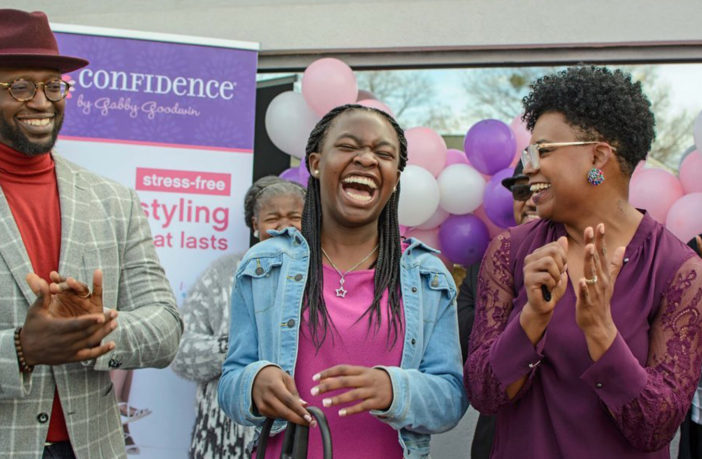How many stories do you know of sixth graders with six-figure businesses? Probably not many, right?
Well, I can never forget the moment I learned about Gabby Goodwin. I was sitting at a business conference contemplating how I was going to grow my own company, when the speaker said, “What if I told you Gabby was making six figures in the sixth grade with her business? Gabby stood up.” At that point, everyone in the room turned to stare at a bright-eyed, confident Gabby Goodwin, the co-founder of Confidence®️ by GaBBY Goodwin and the co-inventor of GaBBY Bows. Then, the speaker asked us, “What’s your excuse?”
The more I learned about Gabby and her dad, Mike Goodwin, and mom, Rozalyn Goodwin, the more I was floored by their story. Gabby’s father, Mike Goodwin, is a comedian and keynote speaker who has been on America’s Got Talent, Dry Bar Comedy, Lifetime, BET, and more. Gabby’s mom, Rozalynn, runs the show behind the scenes for both Gabby and Mike’s business. This family of entrepreneurs has landed on some of the largest media platforms on the planet while still maintaining love, laughter, and growth. This is what real legacy looks like. Keep reading for their story, why once-in-a-lifetime opportunities aren’t always what they seem, and why Gabby started saying that “no” stands for “next opportunity.”
BLACK ENTERPRISE sat down to talk with the Goodwins about their legacy of entrepreneurship.
What businesses do you run and how did you get started with them?
Gabby: I’m Gabby, and me and my mom are the co-founders of Confidence by Gabrielle Goodwin and the co-inventors of Gabby’s Bows, that guaranteed non-slip hair barrette that has two faces so you can always see the design both ways. [The bows have] teeth and are created to trap the hair so it doesn’t fall out.
And we started with a Twitter rant. My mom would spend about 15 or 20 minutes doing my hair in the mornings and would drop me off at school, looking all nice and pretty. Then, she’d pick me up a few hours later to find that half of my barrettes were gone and that my hair was a complete mess. She was doing that consistently, not only wasting that time in the morning, but also wasting a lot of money as she was constantly replacing those barrettes and hair accessories. And so one day, she went on Twitter to rant about how the bows didn’t stay in my hair. Her and many other moms were talking about how terrible these barrettes were, and our pastor actually jumped into the conversation and said, “This sounds like a market you need to break into.” I was about five years old. I didn’t really know what entrepreneurship was. But I did know that one, I wanted to stop getting in trouble for barrettes that accidentally slipped off my thick hair, and two, I wanted to inspire people. And I saw this product as a way to do that. Many other girls who were going through the same issue as me. It’s a generational problem. And I wanted to be able to change that. So I nagged my mom and I was persistent enough to actually create our first demo. We started in February of 2014, and we’ve been for eight years now. I was seven years old when we started and now I am 16.
Rozalynn: There are three patents on this barrette, so it’s the first of its kind. We also have a full line of hair products for girls, as well as a girls’ salon.
Did you work on being entrepreneurs together as a family or did you kind of work in your respective markets?
Rozalynn: I saw Mike’s joy and the passion as he was working with his gift for comedy. I didn’t plan to tell him to pursue comedy full-time, but when you see your spouse’s dreams come alive, all you want to do is encourage that. Every venture that we’ve done are family businesses. Everybody chips in in some type of way. There were years that I was the sole booker, for [Mike]. When he had events, the kids would work his table and sell his merch. We just have always felt that there was something one of us was supposed to do.
We believe in blending versus balancing. “Balancing” can set up a false expectation that things can be equal. So we practice blending. If one of the businesses needs a lot more attention this week, we’re shifting our attention to that. I think we’ve grown and evolved over time. Both of us are a part of the [Traffic Sales & Profit] Business Mastermind. Being around people learning how to work on the business versus in the business has helped us blend our responsibilities as a family as well as a family of entrepreneurs.
How did you get your start in entrepreneurship?
Mike: I’m a stand-up comedian and keynote speaker. I started doing stand-up in December of 2004 at my church for the first time, and hadn’t had any desire to be an entrepreneur. So I maintained the day job while I worked as a college counselor at a private school, and then on the weekends and at night, I was doing stand-up comedy. That developed and grew to about the point where I was making half of my salary doing stand-up part-time. For years, my wife and I talked to our pastor and each other, and we made the decision for me to go full-time doing stand-up in June of 2012.
And then maybe four or five years ago, I had a woman approach me at an event because I do clean material. She had seen me a few times, and she asked me if I did any keynote speaking. I didn’t have the time, but I didn’t want to lose the opportunity. [The woman] was having a conference for social workers out in North Carolina and she didn’t want to send folks home depressed after the tough conversations about neglect, abuse, and budget cuts. She wanted me to come in and provide humor with substance. So I created a keynote talk called “Leadership and Laughter.” I’m pretty selective about the organizations that I speak with. I normally talk to folks in social services, education, and healthcare; folks that primarily pour out into others.
A lot of times people think about comedy and they immediately think about nightclub humor. My saying is that comedy is neutral. It’s what you choose to do with it. I choose to be inspiring, uplifting, and inclusive, as opposed to damaging, belittling, and ostracizing.
How do you define success?
Mike: Success for me, initially, was to take care of my family. Then, it was being seed money for Gabby’s business and keeping the ship afloat until the bows were self-sustaining.
Over time, success was attracting high-level clients. I wanted to do events that were significant with a budget and marketing. Success, for me, required me to move myself to a place where I was being sought out by folks that were serious about event planning.
Gabby: For me, success has kind of been like an idea of satisfaction, where I feel as though I have inspired someone or changed their perspective on things. The whole reason why I’ve really wanted to start this business is to inspire others. People may say they want to hit the seven-figure mark and that’s success. It’s a component, and all the accolades are nice, but success is just being able to actually reach the girls who look like me and who I want to continue to inspire.
Rozalynn: Particularly in my role, just kind of as the engine behind the two businesses, success is keeping everything moving. We also have a son, Michael, who was 12. Success is about every member of our family fulfilling their maximum potential. I think it’s a combination of what Mike said and what Gabrielle said. Success also is establishing generational wealth and a legacy of entrepreneurship that our grandchildren and great grandchildren after us will look back on and say, “they had this dream when they pursued it, and there’s nothing I can’t do.” We started from nothing. I mean, nothing. Literally, just an idea. And now we’ve got a physical product that’s been sold all over the world with three patents. So I think it’s a little bit of inspiration and financial success. We want to be able to leave something, inspirationally, but also financially, and have our family set up for generations to come.
How do you stay true to yourself as a family, and kind of stay true to your ideas of success?
Mike: I think that that’s something that entrepreneurs don’t encounter until it’s too late. You’re doing this great thing and you’re minding your business, nobody’s bothering you. And then you have this awesome thing and everybody wants a piece of it. I’m of the opinion that if I know something’s coming, I better be prepared for it. And there is a level of understanding the value of “no”, and being confident in saying, “Yeah, that’s a great opportunity. It just isn’t for me, or that’s not where my values align.”
Entrepreneurs should establish who they are out on the onset. When I started doing comedy, I was a married father. I wasn’t impressionable. I wasn’t doing comedy to bring me validation; I was doing comedy, because I recognized that I had a skillset that can serve folks. I really feel compelled to share what I’ve come up with. Knowing who you are and what you bring to the table can assist with being able to say no.
Also, unfortunately, a part of entrepreneurship that people don’t talk about is making bad decisions and figuring out that, hey, this isn’t my path. I think the best way to navigate that is to make quick decisions to get out of bad routes and go back the way that we were going. You don’t know what you do until you’re presented with those opportunities, but if you have your core values, you can evaluate each opportunity.
Rozalynn: We do weekly planning, quarterly planning, and annual planning. We’ll reevaluate our mission and our vision and our goals for the year that’s coming up. And, you know, once we’re really pretty solidified on what we want to achieve, it helps us screen opportunities. Coaching, counsel from our pastor, and having people who have been where we are helps us screen as well. I can’t reiterate enough what Mike said. Sometimes you just have to make a mistake. Sometimes you gotta fail. We’ve had big opportunities that on the surface looked amazing. And then we sacrificed and went into debt to try to take advantage of an opportunity, because we just didn’t think that they would ever come back. We thought it was a once in a lifetime opportunity. Then it didn’t work out. Failing in that way has really helped us know that once an opportunity comes to us, no matter how big the name is or how shiny the organization is, we now know how to evaluate it. And this keeps us grounded.
We got opportunities very early to go into retail, and we weren’t ready. Our story is just so amazing, and it drew a lot of attention. We got approached within six months of starting the business to go into some retail stores. Getting on the shelf is easy. Staying on the shelf is the hard part. When a big retailer called, we thought, “yes, this is amazing.” But we didn’t know to really figure out if we were making enough money for the opportunity. Do we have the margin for this? What is our price compared to the competition? Is our price too high? Do we have enough money to bring down our price and buy our barrettes in bulk so we can bring down the price? Do we have any money for marketing? We know to ask those questions now, but just starting off, we thought it was an amazing miracle and we jumped on it. I believe your business should probably be a seven-figure business, or very close to it, before you consider big-box retail, because there are a lot of costs that you’re just not considering.
Once entrepreneurs prioritize the things that you can control about your business, you’re ready to evaluate other opportunities because you’re not desperate. I remember when we first started and got that big opportunity, 80% of our revenue was coming from retail. One decision about the margin totally flipped our business. And I thought, at that moment, we would never be in that position, again. So I just really encourage people to focus on what they can control and not be distracted by the glitz and the glam. A lot of times you’ll see brands who are in stores, but then when you pull them to the side, they’re losing money on the shelves. It’s just a play for them to get more clout or notoriety.
You know, we got a really big opportunity probably about a year ago with a very big media company. I think they meant well. A lot of people meant well, particularly after the murder of George Floyd. People are offering to try to, I guess, level the playing field for Black-owned businesses. But once we really evaluated and talked with coaches and those around us, it was not a good opportunity for us. It looked amazing. And it was scary to tell them no, because we thought maybe they would never come back to us and we never get an opportunity like that again. But we recognize that it was going to put us at high risk to have a bad financial situation again. Regardless of how flashy it looks, and how wonderful it would have looked on a press release, we have to focus on what will be best for our business, our staff that we employ as well as our family.
That’s really powerful. What is some advice that you would give to families about maintaining the family unit while going into business together?
Mike: I think one of the things that I recognized a few years ago was that, as a couple, me and Rozalynn needed to get away from the daily grind. I instituted quarterly getaways where we leave for about two days – we typically will leave on a Sunday and come back on a Tuesday – to spend time together, talking about a business, but also, to cultivate our relationship. I didn’t marry a business partner. I married a person I was romantically interested in. If we spend the majority of our time talking about business, our relationship is failing. I would much rather have a healthy marriage than to have a thriving business and a failing home life. Make sure that you keep the main thing the main thing. The main thing is the marriage.
Do you have advice for the young aspiring entrepreneurs who want to enter into this world?
Definitely recognize that it’s a challenge. This isn’t a kid-based industry. It’s not common that you see many kids having a business and my parents have told me I’m doing a lot for a kid. There will be challenges and things that you will have to face on your own.
To go through those things, you have to believe in yourself. If you don’t believe in yourself, if you don’t have that confidence, nobody else will. So make sure that you are giving off the impression that you know what you’re talking about, and you know what you want to achieve. That will help other people latch onto you and want to help you achieve your dream. Not everything has to be perfect. But if you’re putting the best effort towards it, you will know that you are trying your hardest and reap the benefits of what you are putting in.
The last thing I want to say is a quote that I came up with: no is just an abbreviation for “next opportunity.” So after one “no,” after two “nos,” keep pushing and keep going. There can be so much negative energy towards you, but being able to look forward with that belief, you’ll be able to get to that next opportunity. My business is a testament of that.
Where Can You Find Mike Goodwin?
Website: mikegoodwin.com
Instagram, Twitter, TikTok: @bowtiecomedy
Facebook: Mike Goodwin – Comedian
Where Can You Find Confidence®️ by GaBBY Goodwin?
Website: gabbybows.com
Instagram, Twitter, Pinterest, TikTok: @gabbybows
Facebook: Gabby Bows – Confidence



